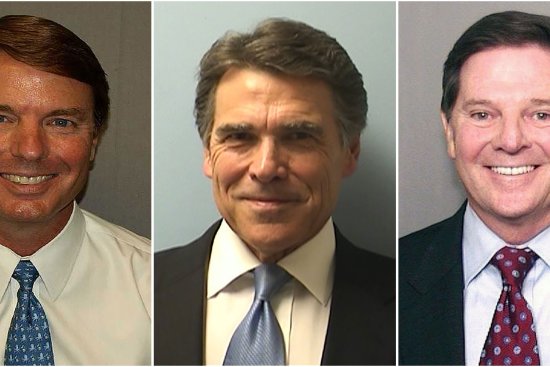
Trump will go into this photo “knowing that he is going to be a meme, both for his supporters and his detractors."
Mug shots are routinely taken when a criminal suspect is arrested. But for some high-level politicians who have found themselves looking at that camera lens, a lot of thinking goes into a key decision: whether or not to smile.
Most famously, former House Majority Leader Tom DeLay, former Texas Governor Rick Perry, and former U.S. Senator John Edwards all smiled in their mug shots. In all of these cases, the pictures represent a deliberate choice by the politician—and it’s one former President Donald Trump will be faced with on Tuesday when he arrives for his arraignment in New York. “He has a split second with a picture that will be shown around the world, and it’s an opportunity to do something in the way he wants,” says Stu Loeser, U.S. Senate Majority Leader Chuck Schumer’s former communications director and former spokesperson for New York City Mayor Michael Bloomberg. Trump will go into this photo “knowing that he is going to be a meme, both for his supporters and his detractors.”
Read More: How Trump Is Negotiating the Details of His Indictment to Maximize the Drama
While the indictment remains sealed, a Manhattan grand jury indicted Trump, reportedly over his alleged role in a hush-money payment to Stephanie Clifford, known as Stormy Daniels in her career as a porn star, during the 2016 presidential election. Clifford says they had an affair, but Trump denies that, and is expected to plead not guilty of any criminal wrongdoing.
Leonard Steinhorn, a professor at American University who specializes in political communication, predicts Trump will aim to convey “defiance, indignation, and a sense that he can get all of his followers to identify with him as a victim of this so-called Deep State that he believes is persecuting him and by implication, persecuting his supporters.” A look of defiance is “basically communicating that he is going to stand up against all of the people who have power and are using it against him and his supporters.”
[time-brightcove not-tgx=”true”]More from TIME
If Trump chooses to smile for the camera, he’ll fit into a history of smiley political mug shots going back nearly twenty years. It began with former Texas congressman and Republican House Majority Leader Tom DeLay, who grinned in an Oct. 20, 2005, mug shot after he was indicted on money-laundering charges. “It was borderline shocking. That hadn’t really been done before,” says Loeser. “But if you don’t think you’re guilty, don’t act like people who are guilty.”
The smile didn’t help keep him out of trouble. Shortly after the mug shot, DeLay stepped down from his leadership post and then resigned from Congress in June 2006. In 2010, a Texas jury convicted him on charges of money laundering and conspiracy to commit money laundering. While he was sentenced to three years in prison, he was free on bail as he appealed the ruling. In 2014, a Texas appeals court upheld an earlier ruling that threw out the conviction.
Read More: How Trump’s Mug Shot Could Fuel a Fundraising Boon—for Trump
In June 2011, former North Carolina U.S. Senator and two-time Democratic presidential candidate John Edwards was so smiley in a mug shot that multiple blogs joked that it looked like a dating profile picture. He pleaded not guilty to charges that he violated campaign finance laws by using almost $1 million in contributions to conceal a mistress who got pregnant with his child while he was running for President in 2008. Exactly a year after being charged, Edwards’ legal ordeal ended when a jury acquitted Edwards of a charge of accepting an illegal campaign contribution and deadlocked on five other charges.
Another Lone Star state politician who smiled in his mug shot: Rick Perry. On Aug. 19, 2014, the then-Republican Governor of Texas, smiled amid charges that he abused his power by pressuring a Democratic district attorney to step down by threatening to cut funding to her office. Perry called the indictment “a farce,” held a press briefing before he had his mug shot taken, and then tweeted a picture of himself at an ice cream parlor afterwards.
“Governor Perry’s public relations strategy is to present this indictment as one blow, low and foul, in an ongoing fight between a disgraced, partisan, Democratic, district attorney and a Republican governor fighting for common decency, the rule of law, and the sanctity of the Texas Constitution,” Cal Jillson, a political scientist at Southern Methodist University, told TIME in 2014. The case was dismissed in 2016.
Unlike DeLay, Perry, and Edwards at the time of their indictments, Trump is trying to make a comeback and running for re-election, so he’ll approach his mug shot with a unique set of considerations. “Anyone in this position has to use this as an opportunity to try and solve their political problem,” Loeser says of the thinking that will go into Trump’s photo. Notes Steinhorn: “Criminals often don’t think about the message they want to send, because they’re not running for President of the United States.”
Correction, April 4
The original version of this story misstated the type of jury that convicted Tom DeLay. It was a jury, not a grand jury.